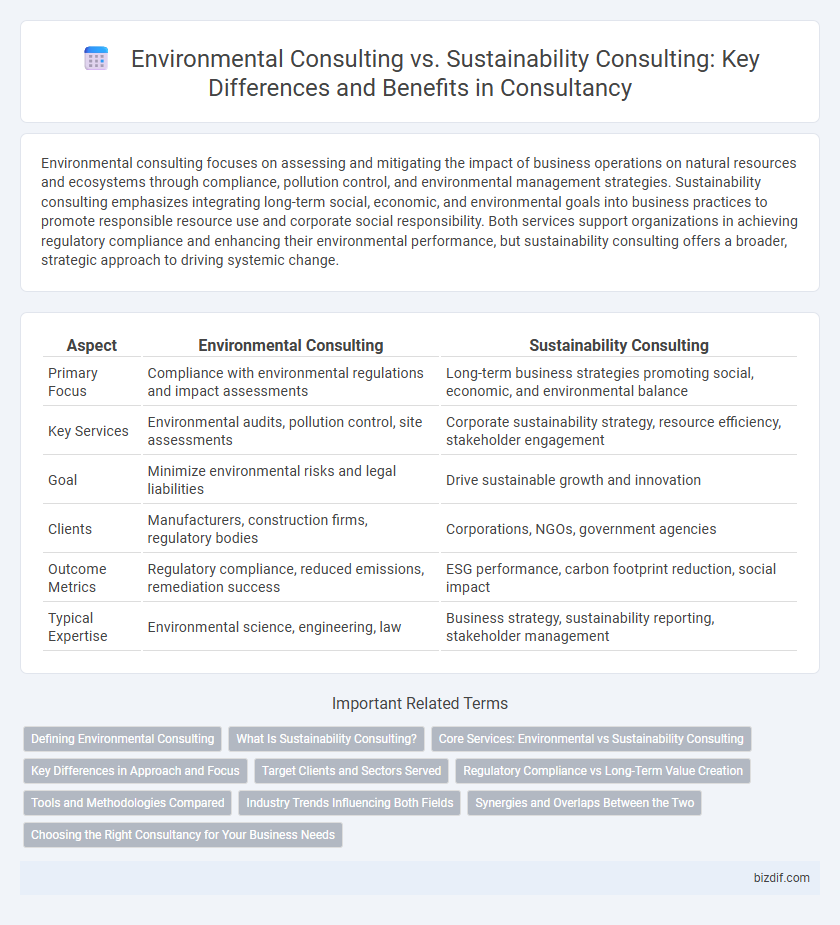Environmental consulting focuses on assessing and mitigating the impact of business operations on natural resources and ecosystems through compliance, pollution control, and environmental management strategies. Sustainability consulting emphasizes integrating long-term social, economic, and environmental goals into business practices to promote responsible resource use and corporate social responsibility. Both services support organizations in achieving regulatory compliance and enhancing their environmental performance, but sustainability consulting offers a broader, strategic approach to driving systemic change.
Table of Comparison
| Aspect | Environmental Consulting | Sustainability Consulting |
|---|---|---|
| Primary Focus | Compliance with environmental regulations and impact assessments | Long-term business strategies promoting social, economic, and environmental balance |
| Key Services | Environmental audits, pollution control, site assessments | Corporate sustainability strategy, resource efficiency, stakeholder engagement |
| Goal | Minimize environmental risks and legal liabilities | Drive sustainable growth and innovation |
| Clients | Manufacturers, construction firms, regulatory bodies | Corporations, NGOs, government agencies |
| Outcome Metrics | Regulatory compliance, reduced emissions, remediation success | ESG performance, carbon footprint reduction, social impact |
| Typical Expertise | Environmental science, engineering, law | Business strategy, sustainability reporting, stakeholder management |
Defining Environmental Consulting
Environmental consulting involves assessing and managing environmental impacts for organizations to ensure compliance with regulations and minimize ecological damage. It focuses on areas such as pollution control, waste management, environmental impact assessments, and remediation strategies. Experts in environmental consulting provide technical guidance to help businesses reduce their carbon footprint and meet legal environmental standards.
What Is Sustainability Consulting?
Sustainability consulting focuses on helping organizations integrate sustainable practices that balance environmental, social, and economic factors to achieve long-term value. It involves strategies for reducing carbon footprints, improving resource efficiency, and aligning business operations with global sustainability frameworks such as the UN Sustainable Development Goals (SDGs). This approach contrasts with environmental consulting, which primarily addresses regulatory compliance and environmental impact assessments.
Core Services: Environmental vs Sustainability Consulting
Environmental consulting primarily focuses on regulatory compliance, environmental impact assessments, and pollution control strategies to help businesses minimize their ecological footprint. Sustainability consulting emphasizes long-term strategies for resource efficiency, corporate social responsibility, and sustainable supply chain management to enhance overall environmental and social performance. Both services aim to improve environmental outcomes but target distinct aspects of ecological and organizational sustainability.
Key Differences in Approach and Focus
Environmental consulting mainly concentrates on compliance with environmental regulations, risk assessment, and managing the impact of projects on natural resources. Sustainability consulting emphasizes integrating sustainable practices into business strategies, focusing on long-term economic, social, and environmental benefits. The approach of environmental consulting is typically reactive and compliance-driven, while sustainability consulting adopts a proactive, holistic strategy aimed at continuous improvement and corporate responsibility.
Target Clients and Sectors Served
Environmental consulting primarily targets industries with significant regulatory compliance needs, such as manufacturing, oil and gas, and construction, providing expertise in environmental impact assessments, pollution control, and remediation. Sustainability consulting serves a broader range of sectors, including corporate, government, and non-profit organizations, focusing on integrating sustainable practices, resource efficiency, and long-term environmental strategies. Both consulting types address critical environmental concerns but differ in scope, with environmental consulting focusing on compliance and remediation, while sustainability consulting emphasizes strategic planning and value creation across diverse industries.
Regulatory Compliance vs Long-Term Value Creation
Environmental consulting primarily targets regulatory compliance by helping organizations navigate complex environmental laws and standards to avoid penalties. Sustainability consulting emphasizes long-term value creation through strategies that integrate economic, social, and environmental goals, fostering resilience and competitive advantage. Both fields intersect but differ in focus: compliance ensures adherence to legal requirements, while sustainability drives innovation and enduring business success.
Tools and Methodologies Compared
Environmental consulting utilizes tools such as environmental impact assessments (EIA), geographic information systems (GIS), and pollution modeling software to evaluate and mitigate ecological risks. Sustainability consulting employs life cycle assessment (LCA), corporate social responsibility (CSR) frameworks, and sustainability reporting standards like GRI to support long-term strategic planning. Both disciplines integrate data analytics and stakeholder engagement methodologies to ensure compliance and promote environmental stewardship.
Industry Trends Influencing Both Fields
Environmental consulting increasingly integrates advanced technologies like remote sensing and data analytics to address complex regulatory requirements and mitigate ecological impacts. Sustainability consulting emphasizes circular economy principles and stakeholder engagement to drive long-term corporate social responsibility and climate risk management. Both fields adapt to rising global regulations on carbon emissions and ESG reporting standards, reflecting growing investor and consumer demand for transparent environmental and social governance practices.
Synergies and Overlaps Between the Two
Environmental consulting and sustainability consulting intersect in their shared focus on reducing ecological impact and promoting responsible resource management. Both disciplines analyze regulatory compliance, carbon footprint reduction, and environmental risk assessment, leveraging data-driven strategies to enhance organizational sustainability. The synergy between environmental and sustainability consulting enables integrated solutions that address immediate environmental concerns while fostering long-term sustainable development goals.
Choosing the Right Consultancy for Your Business Needs
Environmental consulting focuses on assessing and managing the impact of business operations on natural resources, ensuring compliance with environmental regulations and minimizing ecological harm. Sustainability consulting takes a broader approach by integrating economic, social, and environmental strategies to promote long-term business resilience and corporate responsibility. Selecting the right consultancy depends on whether your primary goal is regulatory compliance and environmental protection or driving holistic sustainable growth aligned with global sustainability standards.
Environmental Consulting vs Sustainability Consulting Infographic

 bizdif.com
bizdif.com